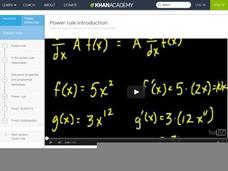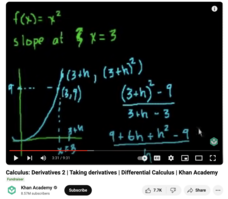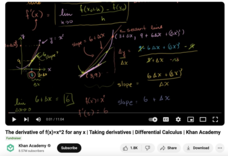Khan Academy
Proof: d/dx(ln x)=1/x
Using the definition of a limit, various properties of logarithms, and a definition of e, Sal shows the proof of the derivative of ln x = 1/x. Note: The video titled "Proof of Derivatives of Ln(x) and e^x,Ó has a more straightforward...
Khan Academy
Proof: d/dx(e^x) = e6x
Using the derivative of ln x, the chain rule, and the definition of a limit, Sal shows proof that the derivative of ex = ex. Note: The video titled "Proof of Derivatives of Ln(x) and e^x,Ó clearly explains this proof.
Khan Academy
Power Rule Introduction (Old) Taking derivatives, Differential Calculus
This video covers the differential notation dy/dx and generalizes the rule for finding the derivative of any polynomial. It also extends the notion of the derivatives covered in the Khan Academy videos, "Calculus Derivatives 2Ó and...
Khan Academy
Calculus: Derivatives 2
Sal continues where he left off with the last video, "Derivatives 1, Ó by looking at the equation y = x^2 and examining the slope of the second line at a specific point, and again defining the limit as x approaches zero to get the slope...
Khan Academy
The derivative of f(x)=x^2 for any x Taking derivatives, Differential Calculus
By defining the formal definition of a derivative, f(x), Sal can find the general form of the derivate function for the example f(x) = x2. He continues to stress the importance of an intuitive understanding of derivative functions.
Khan Academy
Calculus: Derivatives 1
Sal defines the term derivative by taking the listener on a well-organized tour of the slope. First, he reviews the concept of the slope of a line from algebra, then extends this idea to look at the slope of the curve by first examining...
Khan Academy
Calculus: Derivative of x^(x^x)
Sal starts by showing how to find dy/dx of y = x2 and then moves on to show the solution to the more complicated implicit differentiation problem of finding the derivative of y in terms of x of y = x ^ x ^ x.
Khan Academy
Product Rule, Taking Derivatives, Differential Calculus
Sal defines the product rule and then shows two examples of its use. He then shows an example of finding the derivative using the chain and product rules together.
Math TV
Math tv.com: Calculus: Derivatives (The Power Rule)
Students learn how to differentiate functions using the power rule. The learning resource consists of video tutorials with detailed examples. A worksheet with practice problems and an online textbook are included. In the left hand menu,...
Sophia Learning
Sophia: Rolle's Theorem: Lesson 3
Rolle's theorem and when it can be applied to a function are discussed in this lesson. It is 3 of 6 in the series titled "Rolle's Theorem."
Sophia Learning
Sophia: Rolle's Theorem: Lesson 5
Rolle's theorem and when it can be applied to a function are discussed in this lesson. It is 5 of 6 in the series titled "Rolle's Theorem."
Sophia Learning
Sophia: Rolle's Theorem: Lesson 6
Rolle's theorem and when it can be applied to a function are discussed in this lesson. It is 6 of 6 in the series titled "Rolle's Theorem."
Sophia Learning
Sophia: Using Concavity to Optimize: Lesson 2
This lesson practices isolating extremes using concavity of a function. It is 2 of 6 in the series titled "Using Concavity to Optimize."
Sophia Learning
Sophia: Using Concavity to Optimize: Lesson 3
This lesson practices isolating extremes using concavity of a function. It is 3 of 6 in the series titled "Using Concavity to Optimize."
Sophia Learning
Sophia: Using Static Rates of Change: Lesson 2
This lesson practices using the derivative to find a ratio of one parameter to another, which is not time. It is 2 of 6 in the series titled "Using Static Rates of Change."
Sophia Learning
Sophia: Using Static Rates of Change: Lesson 4
This lesson practices using the derivative to find a ratio of one parameter to another, which is not time. It is 4 of 6 in the series titled "Using Static Rates of Change."
Sophia Learning
Sophia: Using Static Rates of Change: Lesson 1
This lesson practices using the derivative to find a ratio of one parameter to another, which is not time. It is 1 of 6 in the series titled "Using Static Rates of Change."
Sophia Learning
Sophia: Using Concavity to Optimize: Lesson 4
This lesson practices isolating extremes using concavity of a function. It is 4 of 6 in the series titled "Using Concavity to Optimize."
Sophia Learning
Sophia: Using Concavity to Optimize: Lesson 1
This lesson practices isolating extremes using concavity of a function. It is 1 of 6 in the series titled "Using Concavity to Optimize."
Sophia Learning
Sophia: Using Concavity to Optimize: Lesson 6
This lesson practices isolating extremes using concavity of a function. It is 6 of 6 in the series titled "Using Concavity to Optimize."
Sophia Learning
Sophia: Using Static Rates of Change: Lesson 3
This lesson practices using the derivative to find a ratio of one parameter to another, which is not time. It is 3 of 6 in the series titled "Using Static Rates of Change."
Sophia Learning
Sophia: Using Static Rates of Change: Lesson 6
This lesson practices using the derivative to find a ratio of one parameter to another, which is not time. It is 6 of 6 in the series titled "Using Static Rates of Change."





















